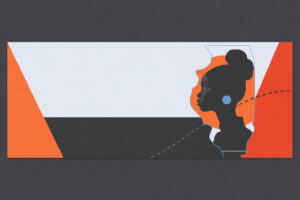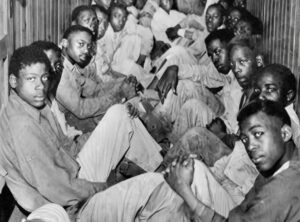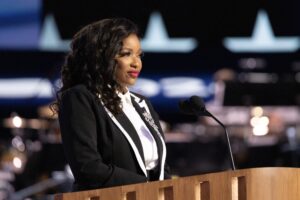I had previously been made fun of for being a girl, and I had previously been made fun of for being Black, but it wasn’t until sixth grade that those two isms collided. By then, the show Martin was a phenomenon. WZUP may have been a fictional radio station based in Detroit, but the sound of Martin’s voice was echoed far beyond the 313 area code. My school didn’t have many Black kids; there was a handful of us, enough to comfort each other, with a comfort that never came for me. At that age, my mother would plait my hair every two weeks, and it eventually got pretty long, a length that perplexed my white classmates and was still not good enough for my Black classmates, most specifically the boys.
There was Albert, who was about as attractive as his name, “It’s not fair, it’s not fair, give the horses back their hair.” Albert led the chant, but Albert did not set the tone. That was reserved for Henry, my crush, and boy, did he do exactly that to my spirit anytime he could. His name for me was, “Beady bee,” and he often referred to my “kitchen” (the back of my hair, for those who live under limestone) being nappy—insults he wasn’t yet witty enough to craft on his own, but had the wherewithal to know how to use them to exact pain. They knew those insults were reserved for only a Black girl, and they knew the best way to tear down my crown was to attack my hair…my Blackness, the same Blackness they shared.
Last week, Ari Lennox, known for her beautiful music and offbeat lyrics that are refreshingly real, revealed that she was harmed by the jokes on Martin aimed at the character Pam, played by Tichina Arnold, who, of course, is dark-skinned.
While many people have brought up the fact that the show was colorist, others feigned being obtuse for likes, and acted as if Pam and Martin’s joking on each other was remotely the same, and that their jokes were based on the same fundamental social issues.
They were not.
Colorism affects jobs, housing, your love life and your overall safety. Having floppy ears and being 5’7 for a man may not be ideal, but to put them in the same category is intellectually dishonest or actual real live stupidity. No one is getting killed because they don’t have to move their car’s seat all the way back and can possibly hear better than others.
Martin came out in the 90s, and to be fair, most of the jokes on the show have not aged well, but the show was by far not the worst thing that happened to the Black community and had many bright spots, so it is understandable why it is so well-loved and well-defended. Still, many things we love are problematic. The portrayal of Shanaynay even played on harmful stereotypes of Black women being masculine, uneducated and loud. Essentially, there were only three women commonly featured on the show, one was played by Martin himself, the other played by a dark-skinned woman whose appearance (specifically related to her being Black), was frequently the butt of jokes and a light skinned woman, whose worst infraction was the size of her forehead, but was still lovable and beautiful enough to glide into the hearts of Black America as the coveted love interest.
In real life, Martin was married twice—once to a light-skinned Black woman with green eyes, and once to a racially ambiguous woman. While Arnold, herself, may not have been harmed by the jokes, to say they weren’t harm-inducing is intellectually dishonest, and if these jokes were made by a white person, those same people making excuses would be in an uproar. In many cases, unlike with Martin and Pam, the jokes like the ones told on the show weren’t returned with a witty rebuttal; they were just lobbed for no reason other than harm.
Misogynoir from Black men doesn’t feel any less painful, and if you really think so, then you so crazy.











